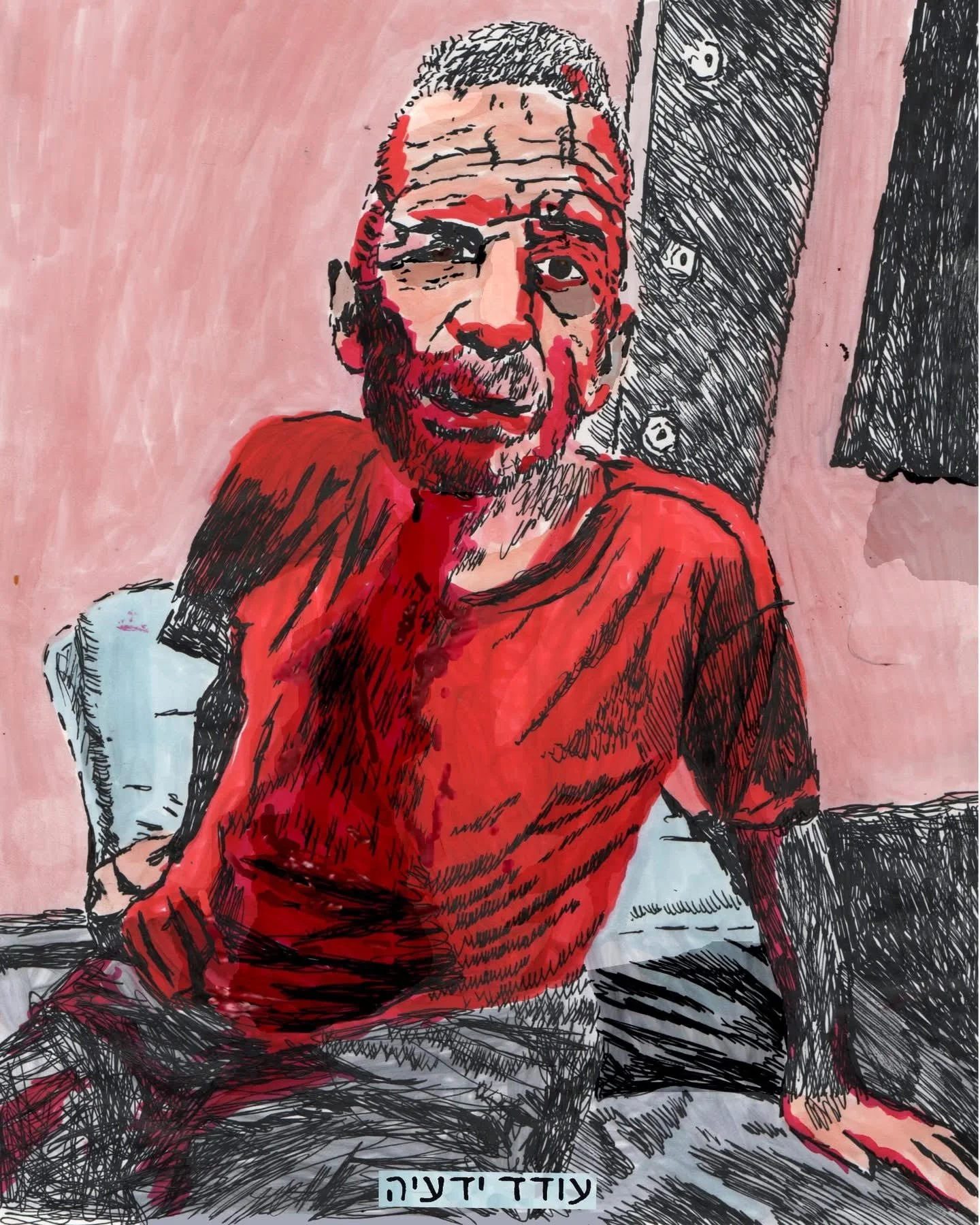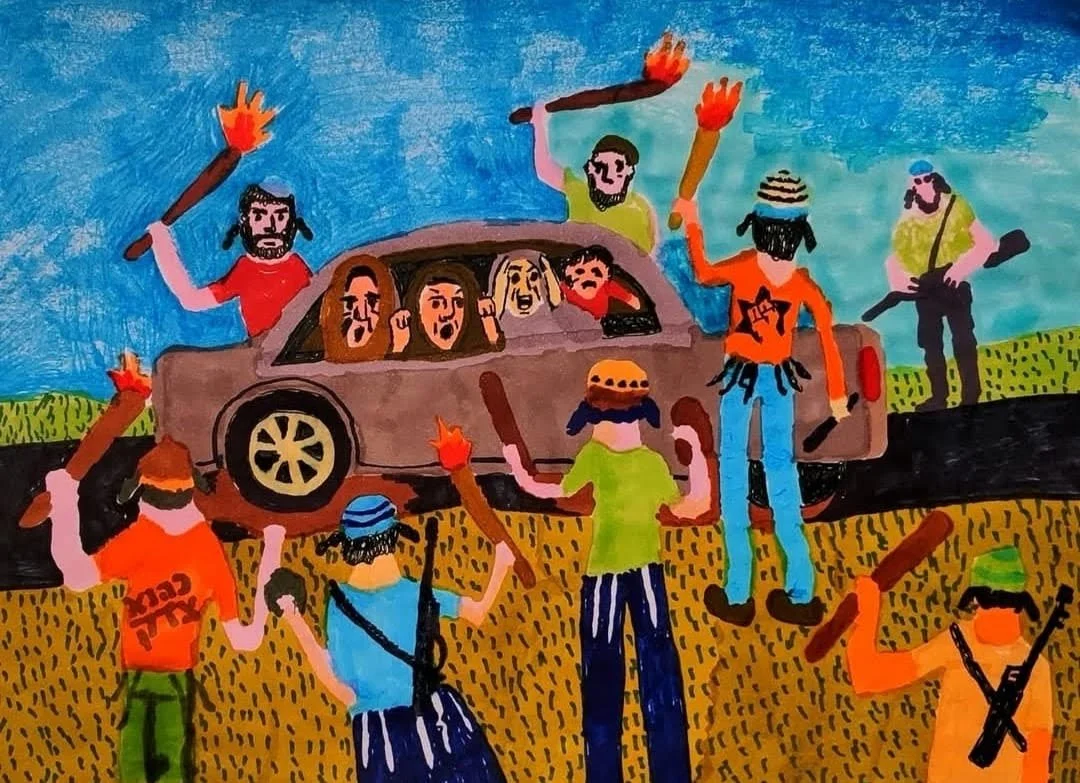Israelis waking up to Jewish terror as West Bank violence surges
Dina Kraft — November 25, 2025
Views and positions expressed here are those of the writer, and do not necessarily represent NJN's views and policy positions.
A photo of a 76-year-old Jewish Israeli man named Oded Yedaya, his face gashed and bloodied, his t-shirt soaked through with blood after a masked Jewish settler in the West Bank struck him with a large rock, went viral in Israeli social media recently.
So did his reaction: “The moment may have come when settlers are trying to kill Jews.”
Yedaya had been among a group of Israelis helping Palestinians harvest olives in the village of Beita, in the northern West Bank outside of Nablus. His cheekbone and jaw were fractured, and his ribs were also injured.
Left: Israeli cartoonist Shoshke Engelmayer represents Oded Yedaya after his attack. Right: Another cartoon by Engelmayer on this theme. (Both are reproduced with the permission of the artist.)
The surging violence by extremist West Bank settlers against Palestinians has been on the edge of people’s awareness for years, but often dismissed with sentients like, “But what terrible thing did the Palestinians do that provoked the violence?”
Now there seems to have been a tipping point in Israeli public opinion, or at least awareness, as attacks by roving bands of young settlers, their faces hidden with masks and balaclavas, escalate to record-breaking proportions.
The attacks have become so severe and systematic they have sparked rare condemnation even from top leaders, including Prime Minister Benjamin Netanyahu. Rampages and physical assaults, including clashes even with Israeli soldiers highlight how out of control the violence has become. Opposition and some former security officials blame the far-right Netanyahu government for tacitly encouraging the unrest, at worst, and conveniently ignoring it at best.
For years Israeli human rights activists and some politicians have been saying the attacks are part of a campaign to push Palestinians off their lands.
October saw the highest number of attacks since record-taking on such violence by the UN began in 2006. There have been assaults on farmers, shepherds, and other civilians, as well as on property including factories, trucks, and cars. There was even a videotaped stabbing attack of sheep. The surge of Jewish terror, a phrase now being increasingly used in the media and public conversation, coincides with the ceasefire halting the Gaza War six weeks ago. That said, settler violence in the West Bank, especially in Area C, where both Palestinian towns and villages and Jewish settlements and outposts exist in uncomfortable proximity, has been on the increase since the October 7 Hamas attack that triggered the war, according to Israeli human rights groups.
The UN Office for Humanitarian Affairs reported 260 settler attacks that led to Palestinian injuries or property damage in October. And according to UN data over 3,200 Palestinians have been run out of their homes because of settler violence since the war began just over two years ago.
Yedaya is a friend of Prime Minister Netanyahu from their days in the army. He served alongside his older brother, Yoni Netanyahu. Yedaya’s daughter, Ella, wrote an open letter to Netanyahu on Nov 9, writing, “Bibi, you are responsible for those terrorists who almost killed my father yesterday. You have been letting this kind of terrorism run rampant for years without intervention. You brought those who support burning villages into the coalition, you gave them control over everything that happens in the West Bank, in the army, and among the police,” referring to Ministers Bezalel Smotrich and Itamar Ben-Gvir.
“You also have the ability to stop this,” she concluded.
About a week later, also amid growing diplomatic pressure including from U.S. Secretary of State Marco Rubio against the violence, Netanyahu spoke out for the first time against the mayhem.
Israel “will take very forceful action against the riots against IDF soldiers – against Palestinians – because we are a nation of laws, and a nation of laws acts in accordance with the law.”
He described the settlers carrying out the attacks as “a minority that goes into Judea and Samaria [the West Bank] and does not represent the large community of law-abiding, loyal settlers.”
The attempt to describe the settler violence as a fringe phenomenon is in keeping with how the settler movement itself describes them. But Israeli activists, including those who have tracked and witnessed the phenomenon in recent decades, argue otherwise.
Now some settlers themselves are adding themselves to those who say this is a bigger problem, not just “errant weeds,” as they are often called by more mainstream settlers.
Over 400 Jewish settlers from the Gush Etzion settlement bloc near Jerusalem signed a petition breaking the silence around the problem and calling on their community leaders to also speak out.
“We, residents of Gush Etzion, lovers of Zion and the Land of Israel, feel that we cannot remain silent in the face of the terrible wave of violence in recent weeks – horrific acts such as houses set on fire, vehicles burned, property and flocks destroyed, shooting, physical assaults carried out against Arabs residing in the Gush Etzion bloc, with the intent of harming children, women, and men… These acts stand in violation of the law, morality, and Jewish law,” the petition reads.
Meanwhile, further evidence of the mainstreaming of the concern over the violence and the toll it is taking, were sketches about it on two of Israel’s main satirical TV shows, Eretz Nehederet and Zehu Zeh.
The Zehu Zeh skit poked fun at an interview on Channel 12 in which the TV anchor, Edva Dadon, suggests Yedaya provoked the attack that landed him in the hospital because he was at the olive harvest site with filming gear to document any possible violence that might erupt.
In the actual Channel 12 interview Dadon says, “Maybe you invited this attack in some way?” To which Yedaya replied that he was there acting as a “protective presence” to protect Palestinians as part of his civic duty, and he lamented that there were not more Israelis joining him to do so.
“There is always this attempt to say there are two sides to this story. But there is not. There is one side that is acting as if it is wild, a community that attacks Palestinians, and there is a side there are the Palestinians being threatened along with those Israelis trying to protect them in non-violent ways.”
He added sarcastically that if one of the non-violent protected presence volunteers were ever to be caught on video holding a stick or stones like the extremist settlers, “This government would surely award them the Israel Prize,” referring to the highest prize granted to Israeli citizens.
Dina Kraft is a journalist, podcaster and the co-author of the New York Times bestseller, My Friend Anne Frank, together with Hannah Pick-Goslar. She lives in Tel Aviv where she's the Israel Correspondent of The Christian Science Monitor and a creator of the podcast Groundwork, about activists working in Israel and Palestine. She was formerly the opinion editor of Haaretz English.
Photo by Deror Avi, CC BY-SA 3.0, via Wikimedia Common


